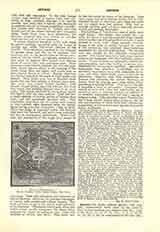

Azymes (Gr. azumos, without leaven; Heb. maççoth), unfermented cakes used by the Jews in their various sacrifices and religious rites (Ex., xxix, 2, 23; Num., vi, 15, 17, 19; Lev., ii, 4; vi, 16-17; vii, 12; viii, 2, 26), as commanded by the Law (Ex:, xxiii, 18; xxxiv, 25; Lev., ii, 11). Their use was also prescribed for the Feast of the Passover (Ex., xii, 8, 15; xiii, 3, 6, 7; Num., ix, 11; Deut., xvi, 3, 4, 8). On account of the facility with which they could be prepared, they were also made in ordinary life for unexpected guests (Gen., xviii, 6; Judges, vi, 19-21, etc.) and in times of necessity, e.g., at the time of the Exodus (Ex., xii, 34, 39), whence the name, “bread of affliction” (Deut., xvi, 3). In I Cor., v, 8, unleavened bread is the type of sincerity and truth. Unleavened cakes were especially used for the Feast of Azymes, also called the “solemn feast” (Num., xxviii, 17). This festival was instituted to commemorate Israel’s deliverance from Egyptian bondage (Ex., xii, 17; xiii, 3-10). Its observance began on the fifteenth of Abib, or Nisan, “the month of new corn”, and continued seven days, the first and last of which were specially solemn (Ex., xii, 15-18; xiii, 7; Lev., xxiii, 6-8, etc.). No other but unleavened bread was allowed during the whole feast. Although originally distinct, the Feast of Azymes and the Feast of the Passover are often treated as one and the same (Deut., xvi, 16; Matt., xxvi, 17; Mark, xiv, 12; Luke, xxii, 1, 7).
F.X.E. ALBERT

